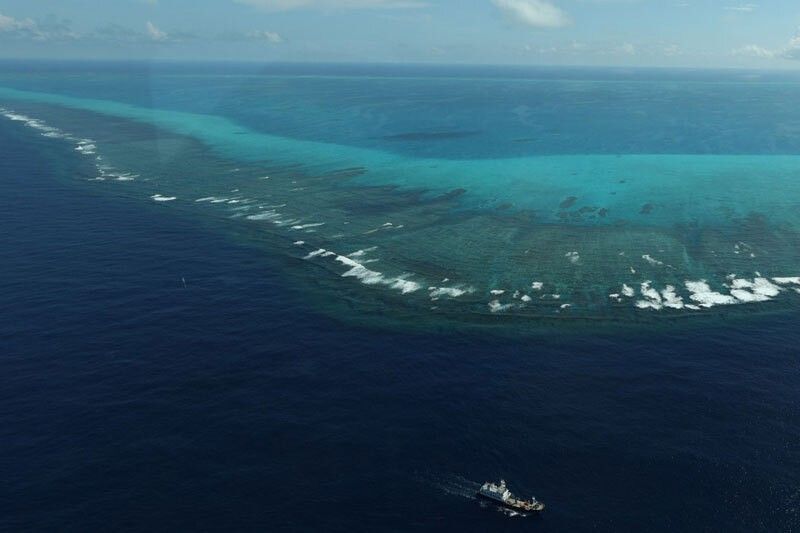Manila urges Beijing to allow scrutiny of disputed shoal by int’l community

THE PHILIPPINES on Monday challenged China to open Scarborough Shoal in the South China Sea to international scrutiny after it accused Beijing of destroying the shoal’s marine environment.
“We are alarmed and worried about the situation that’s happening there,” Philippine National Security spokesman Jonathan E. Malaya told a news briefing.
Government consensus was growing on the need to file a case against China over the destruction of coral reefs, including the harvesting of endangered giant clams, in the South China Sea, he added.
Tensions between the Philippines and China have worsened in the past year as Beijing continues to block resupply missions to Second Thomas Shoal, where a handful of Filipino soldiers are stationed at a grounded ship.
China’s coast guard has on numerous occasions used water cannons against Philippine resupply vessels.
Control of the Scarborough Shoal, seized by China in 2012, figured in the Philippines case at a Hague arbitration tribunal, which ruled in 2016 that Beijing’s claim to almost the entire South China Sea is illegal.
Photographs taken by the Philippine Coast Guard from 2018 to 2019 showed people it said were Chinese fishermen illegally harvesting giant clams, sting rays, topshells and sea turtles, depleting the shoal’s marine environment.
“That’s clear evidence of being careless,” Jay Tristan Tarriela, the coast guard spokesman, told the same briefing. “They don’t really care about the marine environment.”
The Chinese Embassy in Manila did not immediately respond to a request for comment, but China has repeatedly denied it is destroying coral reefs.
“If you really believe in what you’re saying, open up Bajo de Masinloc to international scrutiny, Mr. Malaya said, using the Philippine name for Scarborough Shoal. “It has to be a third party.”
Last week, China’s coast guard published rules to enforce a 2021 law allowing authorities to fire on foreign vessels when its sovereign rights are infringed.
Mr. Malaya said China has no authority over the high seas and the latest regulations are against international law, dismissing these as a “scare tactic” to intimidate and coerce Asian neighbors.
“The Philippines will not be intimidated or coerced by the Chinese Coast Guard,” he said. “We will never succumb to these scare tactics.”
He said countries like Vietnam, Malaysia, Brunei and Indonesia should continue to sail and fish in the South China Sea “to the extent that international law allows.”
“By doing so, we register our strong objections to the illegal regulation which clearly infringes on the rights of other states,” he added.
The Philippine Coast Guard in a separate statement said it would intensify the deployment of “maritime security groups” in six regions that it said are critical to the country.
These are Central Luzon, Southern Tagalog, Central Visayas, Western Visayas, Northern Mindanao and Southwestern Mindanao.
“We reaffirm our commitment to working together to uphold the highest standards of maritime security and ensure the territorial integrity of our country,” Coast Guard Vice Admiral Rolando Lizor N. Punzalan, Jr. said in the statement.
The Philippines should step up efforts to convince the Association of Southeast Asian Nations (ASEAN) to oppose China’s latest rules, Lucio B. Pitlo III, a research fellow at the Asia-Pacific Pathways to Progress Foundation, said by telephone.
ASEAN should come out with “a broader statement that says something along the lines of avoiding actions or steps that will escalate tensions or ensuring that maritime claims are in line with international law,” he said. “Statements along those lines may get support from most ASEAN countries.”
Antonio P. Contreras, a policy expert based in the University of the Philippines Los Baños, said China would likely be sued before the International Criminal Court once it starts detaining fishermen from other countries, which is “clearly against freedom of navigation.”
“They’re going to amplify the conflict,” he said by telephone. “They are going to violate international law again and this time, they might be called to the International Criminal Court.”
“We should keep asserting our rights. That’s the best way to deal with the bully.” — Kyle Aristophere T. Atienza with Reuters



